Are you looking for a tasty and nutritious way to boost your immunity and support digestion? Look no further than the kiwi fruit. This small but mighty fruit contains a wealth of health benefits that make it a smart choice for anyone looking to improve their overall well-being.
First, let’s take a look at the nutrition facts of kiwi. One medium-sized kiwi contains about 64 calories, 2 grams of protein, and 16 grams of carbohydrates, including 3 grams of fiber. It’s also rich in vitamin C, potassium, and vitamin K, making it a nutritional powerhouse.
But the benefits of kiwi go beyond just its nutritional content. Here are some of the ways that incorporating kiwi into your diet can benefit your health:
Principais conclusões:
- Kiwi is a low-calorie fruit that is rich in nutrients like vitamin C, potassium, and vitamin K.
- Incorporating kiwi into your diet can help boost your immunity, aid digestion, and promote heart health.
- Kiwi is also beneficial for skin health and weight loss.
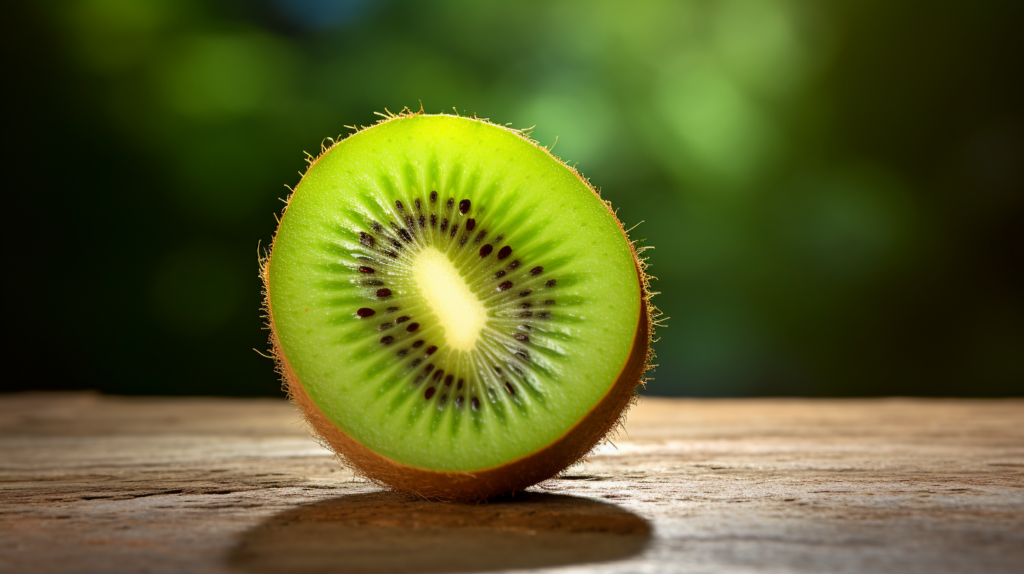
Kiwi’s Nutritional Powerhouse
When it comes to nutrition, kiwi is a powerhouse fruit that offers a wide range of vitamins, minerals, and antioxidants that are essential to your health. One serving (about 2 medium-sized kiwis) contains:
| Nutriente | Quantidade | % Valor diário* |
|---|---|---|
| Vitamina C | 128 mg | 142% |
| Vitamina K | 31.3 mcg | 26% |
| Vitamina E | 1.3 mg | 9% |
| Potássio | 468 mg | 10% |
| Folato | 61.7 mcg | 15% |
| Fibra | 5 g | 18% |
| Antioxidantes | N/A | N/A |
Kiwi is one of the best sources of vitamin C, which is crucial for a strong immune system. One serving of kiwi contains more vitamin C than an orange, making it an excellent fruit to consume during cold and flu season. Vitamin K in kiwi supports blood clotting and is essential for healthy bones. Vitamin E is also present in kiwi, which helps to protect cells from damage by free radicals.
Potassium in kiwi helps to regulate blood pressure and maintain proper hydration levels in your body. Folate is important for healthy fetal development during pregnancy and for cognitive function in adults. Finally, kiwi is also an excellent source of fiber, which aids in digestion and promotes feelings of fullness after a meal.
Strengthening Immunity with Kiwi
Kiwi fruit benefits go beyond their sweet and tangy flavor. They are packed with nutrients that help boost your immunity. Kiwi is a rich source of vitamin C that helps to strengthen your immune system by increasing the production of white blood cells. These cells help your body to fight off infections and diseases.
Kiwi also contains vitamin E, which is a powerful antioxidant that helps to protect your immune cells from damage. This way, your body is better equipped to fight off infections and diseases. Additionally, kiwi contains a good amount of folate, which is essential for the production of new cells in your body, including immune cells. This helps to ensure that your immune system is always in top shape.
Strengthening Immunity with Kiwi
Research has shown that consuming kiwi can help to reduce the severity and duration of respiratory infections. This is because kiwi contains a unique combination of nutrients that help to boost the immune system. These nutrients include vitamin C, vitamin E, folate, and potassium.
Kiwi also contains a unique protein called actinidin that helps to break down proteins in your body. This makes it easier for your body to absorb nutrients that are essential for a healthy immune system. Kiwi is also a good source of dietary fiber, which helps to keep your digestive system in good working order. This is important because a healthy gut is essential for a strong immune system.
Incorporating kiwi into your daily diet is an excellent way to improve your immune health. You can eat kiwi on its own, slice it up and add it to a salad, or use it as a topping for yogurt or oatmeal. Try to consume at least one kiwi a day to reap the full benefits of this delicious fruit.
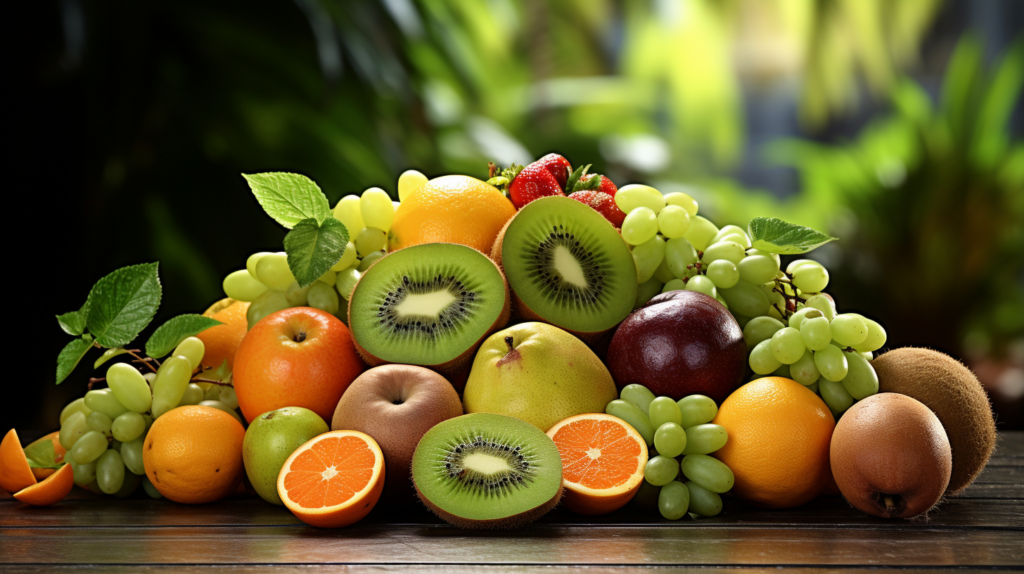
Kiwi Benefits for Digestion
Kiwi fruit is a rich source of dietary fiber, which plays a significant role in promoting healthy digestion. Fiber adds bulk to your stool, making it easier to pass through your digestive system, reducing constipation.
The fiber also helps to feed the beneficial bacteria in your gut, promoting a healthy gut microbiome, which can aid in the absorption of nutrients from the food you eat and lower the risk of digestive disorders like inflammatory bowel disease.
Potassium and Digestive Health
In addition to fiber, kiwis are also rich in potassium, an essential mineral that plays a vital role in maintaining healthy digestion. Potassium helps to regulate the balance of fluids in your body, which can help to prevent constipation and reduce the risk of bloating and gas.
Potassium can also help to relax the muscles in your digestive tract, reducing the risk of cramping and discomfort. This can be particularly beneficial for people who suffer from irritable bowel syndrome (IBS) or other digestive disorders.
Vitamin C and Digestive Health
Kiwis are also a rich source of vitamin C, a powerful antioxidant that can help to reduce inflammation throughout your body, including your digestive system.
Inflammation can increase the risk of digestive disorders like ulcerative colitis and Crohn’s disease. Vitamin C can help to reduce this risk by neutralizing free radicals and reducing oxidative stress in your gut.
In conclusion, kiwi fruit’s high fiber, potassium, and vitamin C content make it a great choice for promoting healthy digestion and reducing the risk of digestive disorders. Try incorporating kiwis into your diet to reap these impressive benefits.
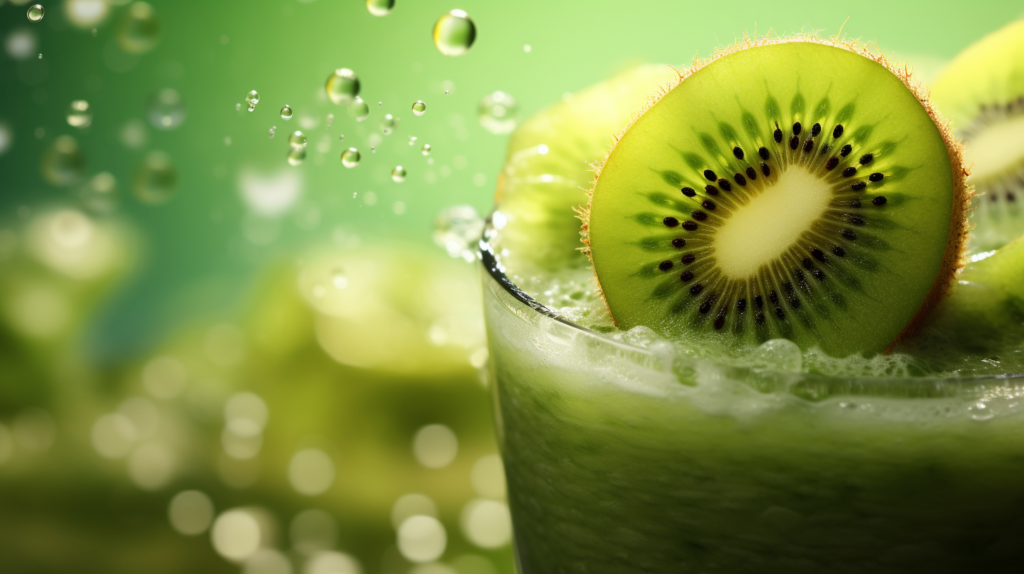
Kiwi and Skin Health
If you’re looking to enhance your skin health, you may want to consider adding kiwi to your daily diet. This vibrant tropical fruit is packed full of essential nutrients and vitamins, which can help to boost your skin’s natural radiance and vitality.
Kiwi is rich in Vitamin C, a potent antioxidant that can help to prevent skin damage from environmental stressors, such as pollution and UV light. This vitamin also plays a key role in the production of collagen, a protein that is essential for maintaining skin elasticity and reducing the appearance of fine lines and wrinkles. In fact, just one kiwi fruit contains almost 120% of your recommended daily intake of Vitamin C!
Kiwi also contains Vitamin E, another powerful antioxidant which can help to protect your skin from oxidative stress. This vitamin has also been shown to help reduce inflammation and promote wound healing, making it particularly beneficial for those with acne-prone or sensitive skin.
Additionally, kiwi is high in fiber, which can help to regulate digestion and promote healthy bowel movements. By reducing waste and toxins in the body, you may notice an improvement in your skin’s overall appearance and clarity.
How to Incorporate Kiwi into Your Diet for Optimal Skin Health
- Slice a kiwi and add it to your breakfast cereal or oatmeal.
- Blend kiwi into a smoothie with other antioxidant-rich fruits, such as blueberries and strawberries.
- Top a spinach salad with sliced kiwi, walnuts, and a vinaigrette dressing.
- Enjoy kiwi as a snack on its own or paired with yogurt or cottage cheese for a protein boost.
By incorporating kiwi into your daily diet, you may notice a visible improvement in your skin’s overall health and vitality. Whether you choose to eat it sliced, blended, or whole, this tropical fruit is a simple and delicious way to enhance your health from the inside out.
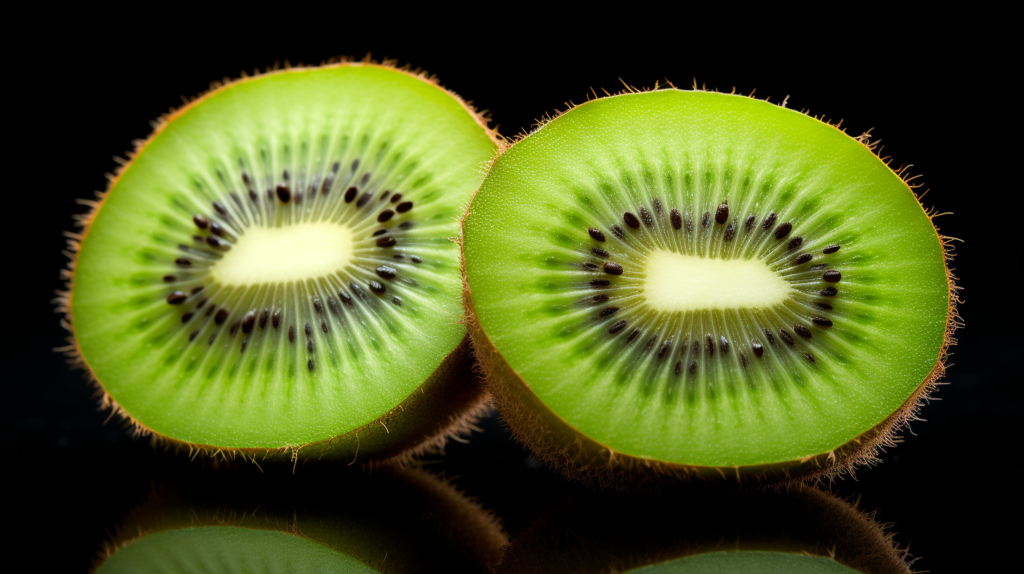
Kiwi’s Role in Weight Loss
If you’re looking for a simple and natural way to boost your weight loss efforts, consider adding kiwi to your diet. This small but mighty fruit is packed with nutrients that can help you shed those extra pounds.
One of the ways kiwi can aid in weight loss is by its high fiber content. A single kiwi contains around 2 grams of fiber, which can help you feel fuller for longer periods of time. This can prevent overeating and snacking on unhealthy foods throughout the day.
Kiwi also contains a digestive enzyme called actinidin, which can help break down protein and facilitate digestion. This can be particularly helpful for those who struggle with bloating or constipation.
In addition to its fiber and digestive benefits, kiwi is a low-calorie fruit, with only around 50 calories per fruit. This makes it a great snack option for those looking to reduce their calorie intake.
To incorporate kiwi into your diet for weight loss, try adding slices to your morning oatmeal or yogurt, or enjoy a kiwi as a midday snack. With its delicious sweet and tangy flavor, kiwi can be a refreshing addition to any meal or snack.
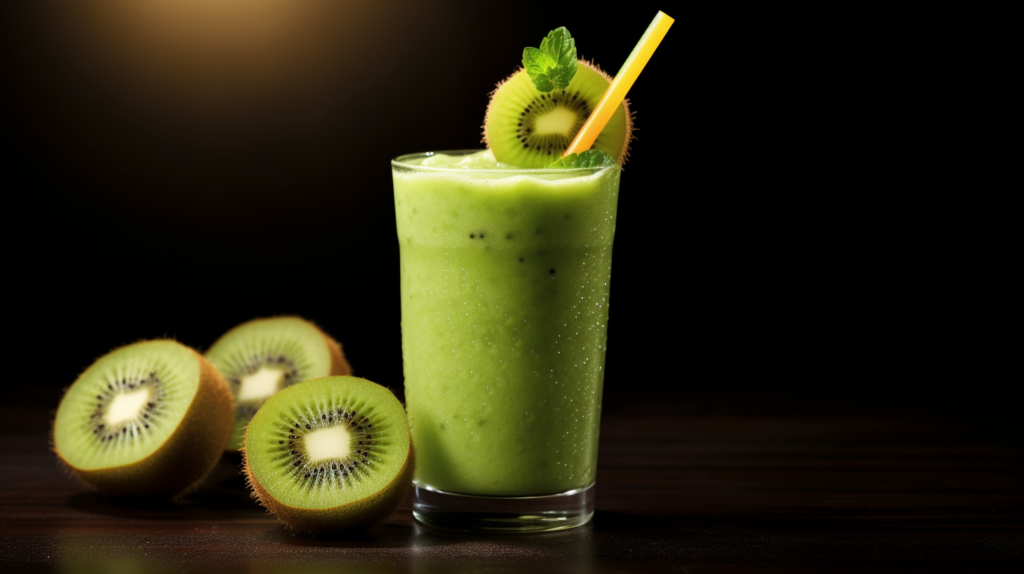
Heart Health and Kiwi
Your heart is a vital organ that needs to be taken care of through a healthy diet and lifestyle choices. Kiwi fruit is a great addition to your daily meals to promote heart health.
One of the reasons why kiwi is great for heart health is because it is loaded with antioxidants like vitamin C and polyphenols. These antioxidants work to prevent the oxidation of LDL cholesterol, which is the bad cholesterol that can cause plaque buildup in your arteries.
Reduzir a inflamação
Inflammation can cause damage to your arteries and lead to plaque buildup. Kiwi fruit contains a compound called serotonin that helps to reduce inflammation in the body. By including kiwi in your diet, you can help reduce your risk of heart disease caused by inflammation.
Additionally, kiwi fruit is a great source of fiber, which can help to reduce your LDL cholesterol levels. High levels of LDL cholesterol can contribute to the buildup of plaque in your arteries, increasing your risk of heart disease.
Regulating Blood Pressure
Kiwi fruit is also a great source of potassium, which can help to regulate blood pressure. High blood pressure can put a strain on your heart and increase your risk of heart disease. By including potassium-rich foods like kiwi fruit in your diet, you can help to regulate your blood pressure and protect your heart.
Incorporating kiwi fruit into your daily diet is a delicious way to promote heart health. You can add kiwi to your morning smoothie, slice it up and add it to your yogurt, or even make a kiwi salsa to top your fish or chicken. With its many health benefits, kiwi fruit is a heart-healthy choice you won’t regret.
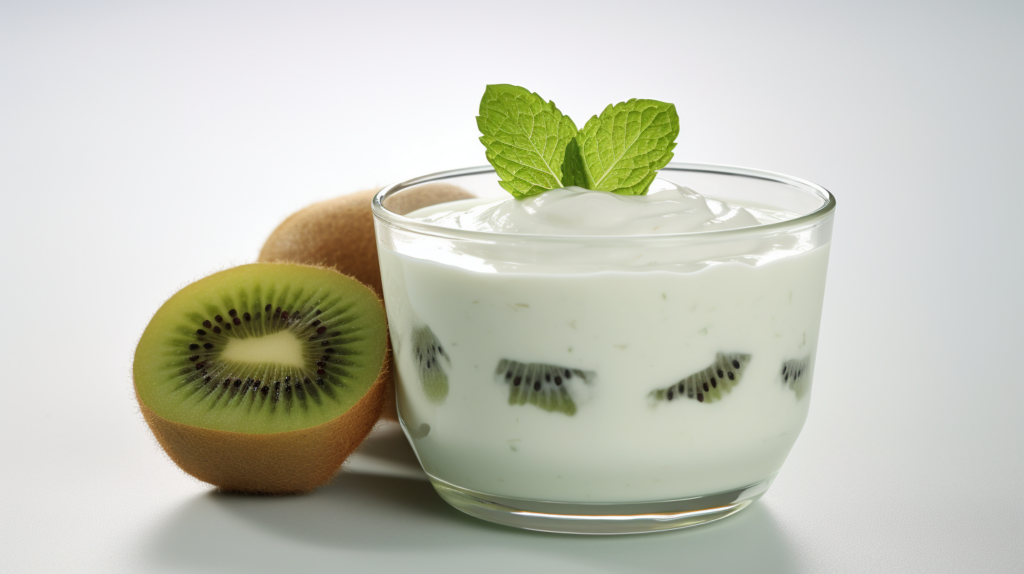
Incorporating Kiwi into Your Diet
Kiwi fruit benefits are numerous, making it an excellent addition to your diet. Here are some tips on how to incorporate this delicious fruit into your meals:
| Meal Time | Recommendation |
|---|---|
| Pequeno-almoço | Slice kiwis for a colorful addition to your breakfast bowl of yogurt, granola and berries. |
| Almoço | Add kiwi slices to your salad or mix them with other fruits for a refreshing fruit salad. |
| Lanche | Enjoy kiwi slices on their own or as a tasty addition to your smoothie. |
| Dessert | Top off your favorite dessert with kiwi slices for a sweet and tangy twist. |
You can also try replacing your usual snacks with kiwi fruit. One medium-sized kiwi has only about 60 calories, making it a great choice for weight management. You can also slice it and freeze it for a delicious and healthy treat.
Kiwi is a versatile fruit that can be used in many different ways to add flavor, color, and nutrition to your meals. Try incorporating this delicious fruit into your diet to reap its wonderful health benefits.
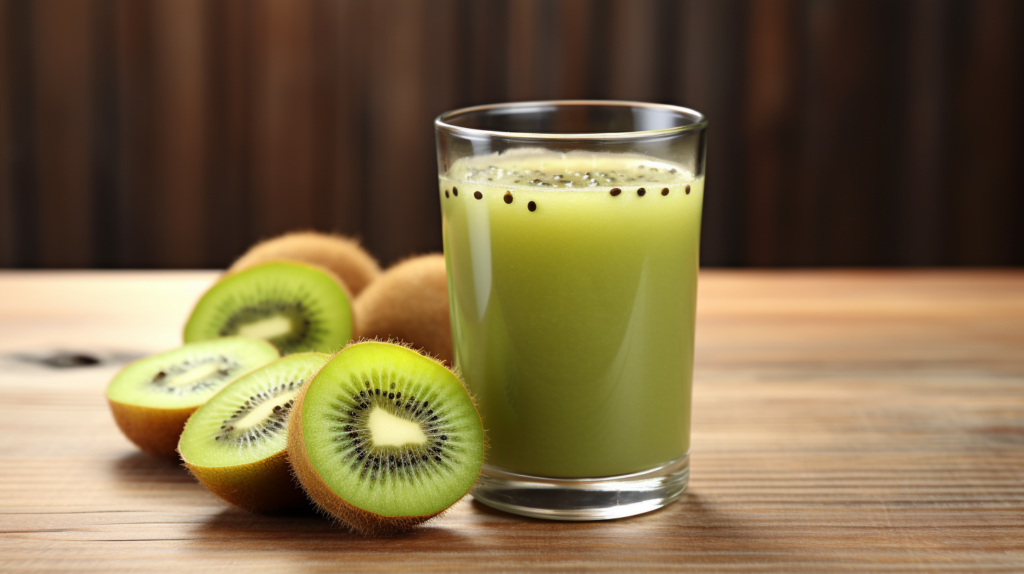
Conclusão
As you have learned throughout this article, kiwi is a nutritional powerhouse that offers a wide range of health benefits. From boosting immunity and aiding in digestion to promoting heart health and weight loss, kiwi truly is a superfood worth incorporating into your diet.
If you’re looking to strengthen your immune system, kiwi’s high vitamin C content makes it a top choice. Additionally, kiwi’s enzymes and fiber make it great for promoting healthy digestion. And for those looking to improve their skin health or reach weight loss goals, kiwi’s antioxidants and low calorie count make it a perfect addition to any diet.
Don’t be afraid to get creative in the kitchen with kiwi. Add it to your morning smoothie, slice it up for a colorful fruit salad, or use it as a topping for your yogurt. The possibilities are endless!
So next time you’re at the grocery store, don’t forget to pick up some kiwi and start reaping the many health benefits this amazing fruit has to offer.
FAQ
Q: Can kiwi boost immunity?
A: Yes, kiwi is known for its ability to naturally boost immunity. It is rich in vitamin C, which helps strengthen the immune system and protect against various illnesses and infections.
Q: How does kiwi aid digestion?
A: Kiwi contains an enzyme called actinidin, which aids in digestion by breaking down proteins. It also has fiber, which promotes regular bowel movements and supports a healthy digestive system.
Q: What are the benefits of kiwi for skin health?
A: Kiwi is packed with antioxidants, vitamins, and minerals that can improve skin health. It helps in collagen production, which keeps the skin firm and reduces signs of aging. The high vitamin C content also contributes to a brighter complexion.
Q: Can kiwi help with weight loss?
A: Yes, kiwi can be beneficial for weight loss. It is low in calories and high in fiber, which can help you feel full for longer and prevent overeating. Additionally, the natural sugars in kiwi are less likely to cause a spike in blood sugar levels.
Q: How does kiwi benefit heart health?
A: Kiwi is heart-healthy due to its high potassium content, which helps regulate blood pressure and maintain a healthy heart rhythm. It also contains fiber and antioxidants that support heart health by reducing cholesterol levels and preventing oxidative stress.
Q: How can I incorporate kiwi into my diet?
A: There are many ways to include kiwi in your diet. You can simply eat it on its own as a snack, add it to smoothies, salads, or yogurt, or use it as a topping for desserts. Get creative and experiment with different recipes to enjoy the benefits of kiwi.














